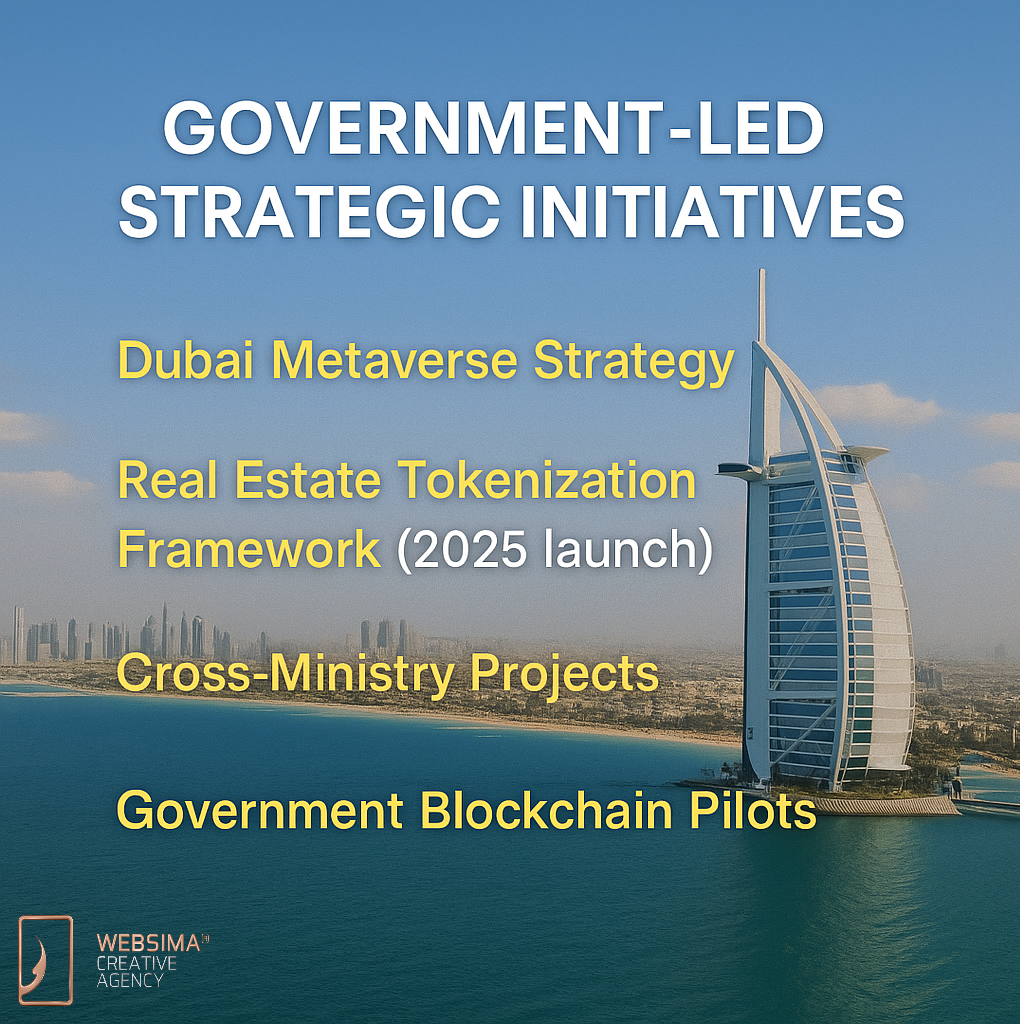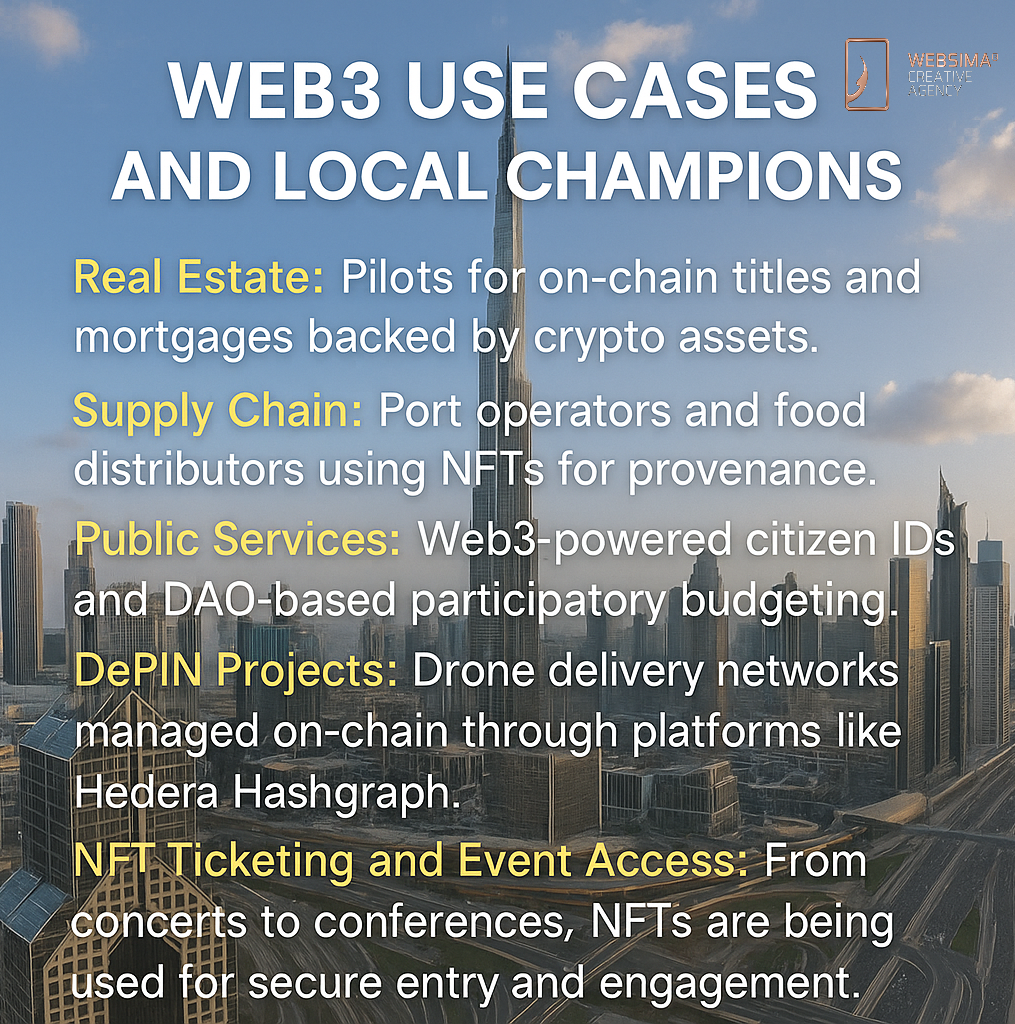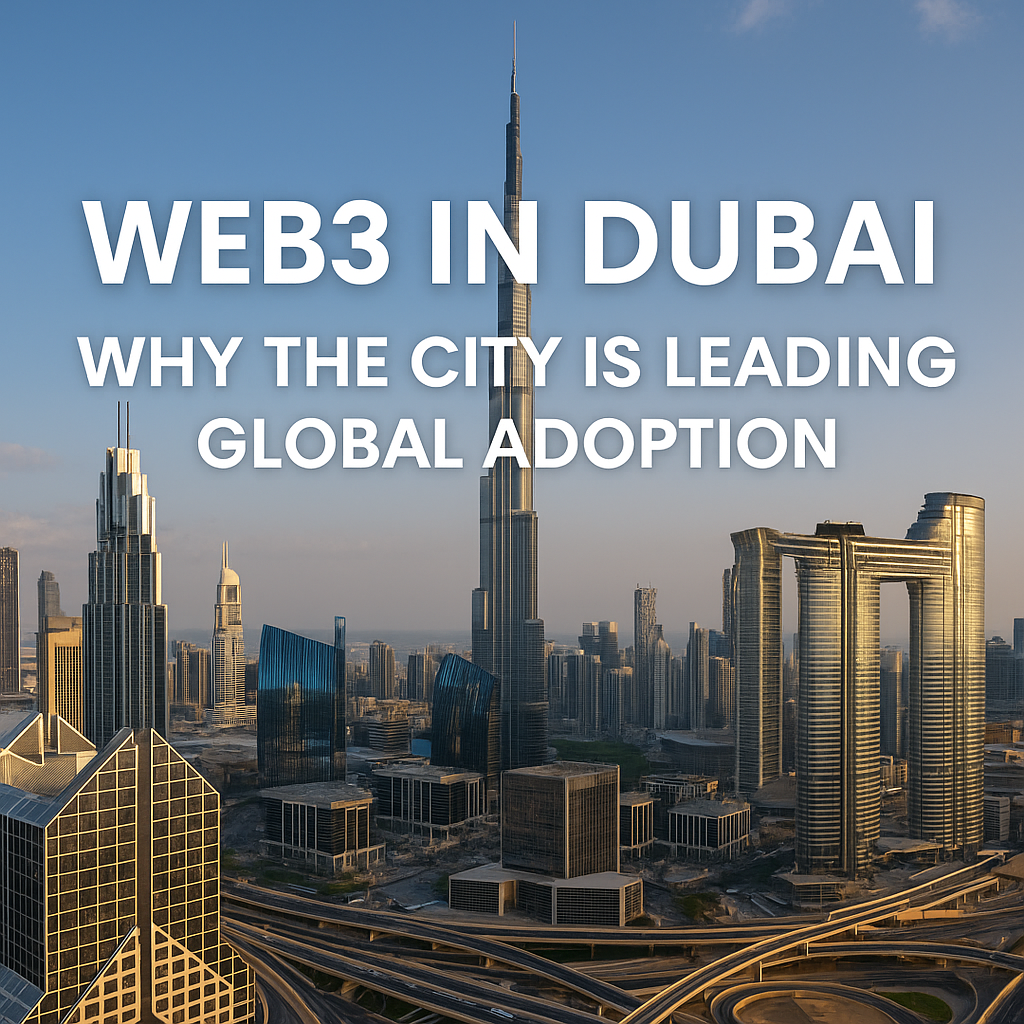Table of Contents
- Introduction: Dubai’s Strategic Pivot
- Dubai’s Multi-Layered Regulatory Ecosystem
- Infrastructure & Innovation Hubs Fueling Web3 Growth
- Government-Led Strategic Initiatives
- Tax Incentives and Talent Magnet Policies
- Capital Flows: Funding the Web3 Revolution
- Web3 Use Cases and Local Champions
- Global Companies Rooting in Dubai’s Web3 Hub
- Challenges and Mitigation Strategies
- Future Outlook
- Call to Action: Build with Websima
Introduction: Dubai’s Strategic Pivot
Dubai has evolved far beyond oil and tourism—emerging as a global hub for Web3 innovation. From the Dubai Blockchain Strategy in 2016 to the ambitious Dubai Metaverse Strategy, the city has committed itself to building a tech-driven economy rooted in decentralization, tokenization, and immersive experiences. With more than 700 blockchain-related companies already operating in the emirate and a regional market forecast to hit $40 billion by 2027, Web3 Dubai is no longer speculative—it’s operational and globally influential, generating shining opportunities for entrepreneurs for building Web3 applications in Dubai.
NEW: Sui partners with Dubai’s VARA to support startups, develop local talent, and provide regulatory guidance for Web3 innovation in the Middle East. pic.twitter.com/hZqbHZL3IU
— Cointelegraph (@Cointelegraph) June 5, 2025
Dubai’s Multi-Layered Regulatory Ecosystem
Dubai offers an exceptional regulatory model composed of:
- Virtual Assets Regulatory Authority (VARA) – The world’s first independent regulator solely focused on digital assets. VARA governs licensing, compliance, and operations for everything from crypto exchanges to tokenized platforms.
- Dubai International Financial Centre (DIFC) and Abu Dhabi Global Market (ADGM) – These zones offer common-law frameworks, sandbox environments, and full recognition of smart contracts, allowing for token launches, DeFi projects, and DAOs with legal backing.
- UAE Federal Alignment – In February 2024, the UAE was officially removed from the FATF “grey list” after demonstrating strong AML/CTF compliance, cementing international trust in its digital financial framework.
This layered ecosystem makes Web3 Dubai one of the most legally secure and forward-compatible jurisdictions for blockchain development.
Infrastructure & Innovation Hubs Fueling Web3 Growth
Dubai isn’t just writing policy—it’s building a launchpad for Web3 builders:
- DIFC Innovation Hub – Home to over 700 tech companies and growing rapidly through its AI and Web3 Campus with subsidized office space and funding support.
- DMCC Crypto Centre – A complete ecosystem for crypto and Web3 startups, with licenses covering mining, trading, tokenization, and advisory services.
- Future Blockchain Summit – Dubai’s flagship annual Web3 event, bringing together global investors, startups, and regulators to form new partnerships and regulatory frameworks.
- 5G, cloud, and edge computing infrastructure – The UAE ranks among the top 10 globally in digital readiness, allowing real-time operations such as DePIN, metaverse gaming, and NFT marketplaces.
Government-Led Strategic Initiatives

Dubai’s top-down approach includes aggressive and specific strategies:
- Dubai Metaverse Strategy – Aims to create 40,000 virtual jobs and position Dubai among the top 10 metaverse economies by 2030.
- Real Estate Tokenization Framework (2025 launch) – Built in partnership with DLD, VARA, and Dubai Future Foundation to enable fractional property ownership via blockchain.
- Cross-Ministry Projects – The UAE Ministry of Energy has even explored Web3 governance applications through a partnership with Shiba Inu.
- Government Blockchain Pilots – Supply chain, legal notarization, customs, and public service delivery are already using blockchain in Dubai’s smart government infrastructure.
Tax Incentives and Talent Magnet Policies
- 0% Personal Income Tax and Capital Gains – One of the most attractive fiscal environments for crypto founders and investors.
- Golden Visa Program – Offers 10-year residency to Web3 entrepreneurs, developers, and investors without requiring local sponsorship.
- Crypto-Friendly Banks and Payment Systems – Several UAE-based fintech firms are integrating fiat-to-crypto gateways, solving a global pain point for startups.
Dubai’s regulatory and economic model not only attracts talent—it anchors it.
Capital Flows: Funding the Web3 Revolution
Dubai’s Web3 ecosystem is highly liquid, with support coming from:
- Future District Fund – A $275 million venture fund specifically created to back startups in blockchain, Web3, AI, and fintech.
- CV Labs & DMCC Partnership – Connects Swiss venture capital with Dubai Web3 startups.
- Bybit & Ghaf Labs Accelerator – Joint program to invest in and grow MENA-based Web3 founders.
- TOKEN2049 and Web3 Hub Davos – Dubai’s hosting of high-profile events creates deal flow and international exposure for local builders.
Web3 Use Cases and Local Champions

Dubai isn’t experimenting—it’s executing:
- Real Estate: Pilots for on-chain titles and mortgages backed by crypto assets.
- Supply Chain: Port operators and food distributors using NFTs for provenance.
- Public Services: Web3-powered citizen IDs and DAO-based participatory budgeting.
- DePIN Projects: Drone delivery networks managed on-chain through platforms like Hedera Hashgraph.
- NFT Ticketing and Event Access: From concerts to conferences, NFTs are being used for secure entry and engagement.
Global Companies Rooting in Dubai’s Web3 Hub
Some of the world’s biggest Web3 names are relocating or expanding to Dubai:
- CoinW – Moved headquarters from Asia to Dubai, citing favorable regulation.
- OKX – Built a regional hub to serve the MENA market.
- Binance – One of VARA’s earliest licensees, deeply involved in Dubai’s Web3 financial ecosystem.
- Animoca Brands – Partnered with local governments to develop metaverse infrastructure.
- Superteam UAE – Solana-based developer community helping launch local projects across DeFi, NFTs, and infrastructure.
Challenges and Mitigation Strategies
Despite success, Dubai’s Web3 ecosystem must address:
- Jurisdictional complexity – DIFC, ADGM, and VARA all have separate rules; Websima helps clients navigate this.
- Talent shortages – While visas attract talent, Dubai still depends on education partnerships and global recruitment.
- Regulatory Overreach – VARA’s strict onboarding process can deter early-stage firms without compliance support.
- Smart Contract Vulnerabilities – Require professional audits, security standards, and chain analytics tools.
Dubai is proactively addressing these challenges through policy tweaks, education hubs, and global collaborations.
Future Outlook
By 2030, Dubai aims to become the world’s most interoperable Web3 jurisdiction:
- Launch of a Digital Dirham for CBDC experiments.
- Cross-border Web3 integration with GCC and EU partners.
- Government-run NFT marketplace for public documents.
- Full real estate tokenization, enabling on-chain deeds, rentals, and auctions.
- Creation of a machine-native economy via DePIN, IoT, and AI smart contracts.
Dubai’s transformation isn’t futuristic—it’s happening in real time. Despite of the advantages Dubai is providing, it is crucial to understand the process of Crypto licensing in Dubai and what Web3 entrepreneurs should know.
Build with Websima
Dubai has set the global benchmark for regulatory clarity, blockchain innovation, and digital-first economics. At Websima, we help founders, governments, and enterprises build the future of Web3 in the heart of the UAE.
Our services include:
- VARA, DIFC, and ADGM regulatory compliance
- Smart contract development and audit
- Tokenomics, staking, and DeFi platforms
- Government pilot partnerships and sandbox enrollment
- NFT infrastructure and real estate tokenization
Contact Websima today and join the companies shaping the next era of the internet—right from Web3 Dubai.





